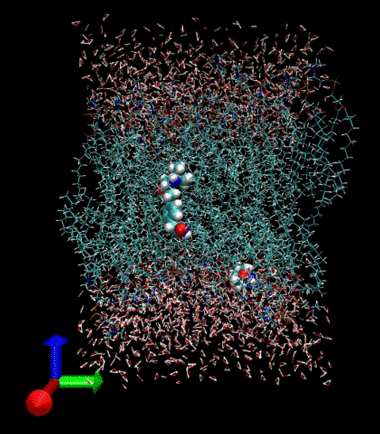by Katie Weeks
The National Grid Service (NGS) is the UKs Grid for academics from all fields. Our users range from chemists to bioinformaticians to social scientists. The ultimate aim of the National Grid Service is to provide a wide range of computing and data resources and services for all users without requiring them to know anything about Grid computing.
Having entered production in September 2004 with four core sites (at the University of Manchester, the University of Oxford, the Science and Technology Facilities Council Rutherford Appleton Laboratory and the White Rose Grid at Leeds University), the NGS is now well on the way to achieving this aim, and has grown to include six partner sites at Cardiff University, University of Bristol, Lancaster University, University of Westminster, Queen's University Belfast and the UK's supercomputer HPCx. The National e-Science Centre in Edinburgh is also an affiliate of the NGS.
More than five hundred users from all areas of research are currently registered on the NGS. Projects include large simulations of drug permeations through a membrane, studies of the molecular basis for HIV drug resistance, modelling of the human heart, computational modelling of aircraft structures and simulations of the generation of magnetic fields in the Sun and in planets. The NGS also provides an Oracle database service for the storage of large amounts of data, such as the database of possible crystal structures for the Control and Prediction of the Organic Solid State (CPOSS) project.

The NGS currently runs Globus Toolkit 2 on its core nodes. The second phase of NGS began in October 2006, and in the summer of 2007 will see each of the four core sites installing new clusters with Globus Toolkit 4, while retaining backwards compatibility with Globus Toolkit 2. Access is managed via X.509 digital certificates, which users must have before applying to the NGS. The move to Globus Toolkit 4 will enable Web service support and development. The NGS is working with users and developers in this area in order to better understand the requirements of such a service.
The diversity of users on the NGS requires a wide range of programs to be installed. As well as standard compilers such as Gnu, Java and Intel, many libraries and specific scientific packages are run on nodes within the NGS, including Siesta, Gaussian, ncbiBlast and dl_poly. Users are encouraged to request the installation of software useful to them, subject to licence constraints that affect the installation of many commercial products. There is also an area reserved on the STFC-RAL node for users to install their own and open-source software without making an official request.
Whilst the NGS has been in production for two years, it recognizes there is still a long way to go to meet all user requirements. The NGS support centre, led by the STFC Rutherford Appleton Laboratory, works to ensure that users are supported throughout their Grid career and that all requests for improvements are listened to. User forums are held twice a year to encourage users to become involved in the development and future planning of the NGS.
Research and development for the NGS is always in progress. Some of the more recent research includes the installation and development of the EGEE glite Resource Broker to work with the Message Passing Interface (MPI) standard. The recently released Applications Repository, a portlet that allows users to submit jobs via a Web interface using standard job templates for software such as Gaussian and dl_poly, is undergoing continuous development in response to user feedback. And whilst the monitoring of individual usage has been running since the NGS entered production, the User Accounting System was only launched in October 2006 after months of work. The NGS Usage Accounting System was developed because no other Grid accounting system met the needs of the NGS. The system allows the monitoring and accounting of individual accounts, with automatic e-mail alerts when a user reaches 90% of their allocated quota, and automatic account deactivation when they exceed their quota. Further research and development is going into the Usage Accounting System to enable it to accommodate virtual organisation management (VOM) and storage services.
The NGS has grown steadily since entering production, but with plenty of room left and with more partner sites lining up to join and offer their resources, the future looks bright for the NGS. The user base is expanding as more people realize what the NGS can offer them, and with services and support developing all the time, this can only continue.
Link:
http://www.ngs.ac.uk/
Please contact:
UK NGS Helpdesk
Tel: +44 1235 446822
E-mail: support![]() grid-support.ac.uk
grid-support.ac.uk










